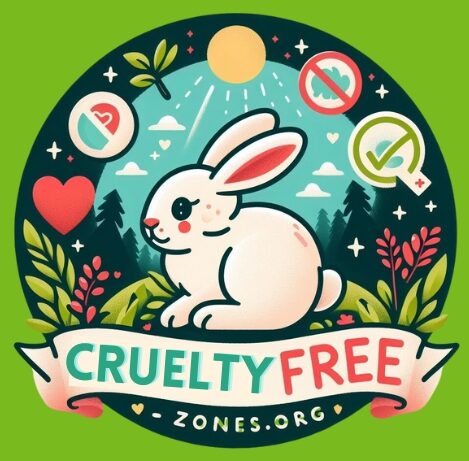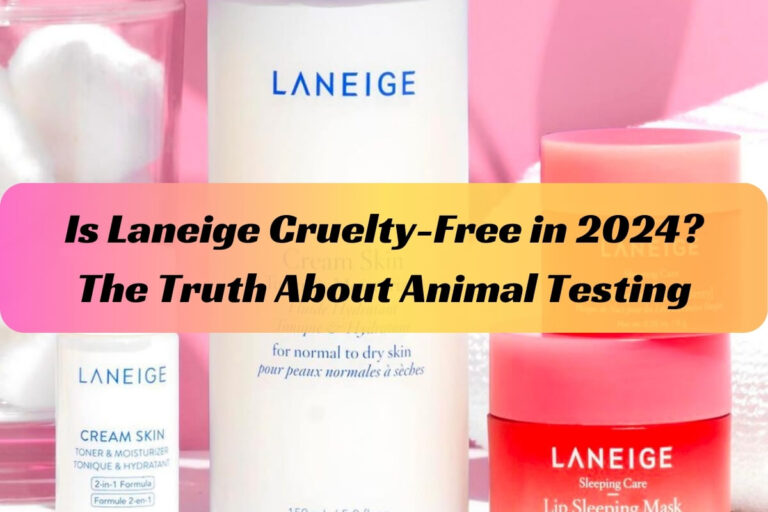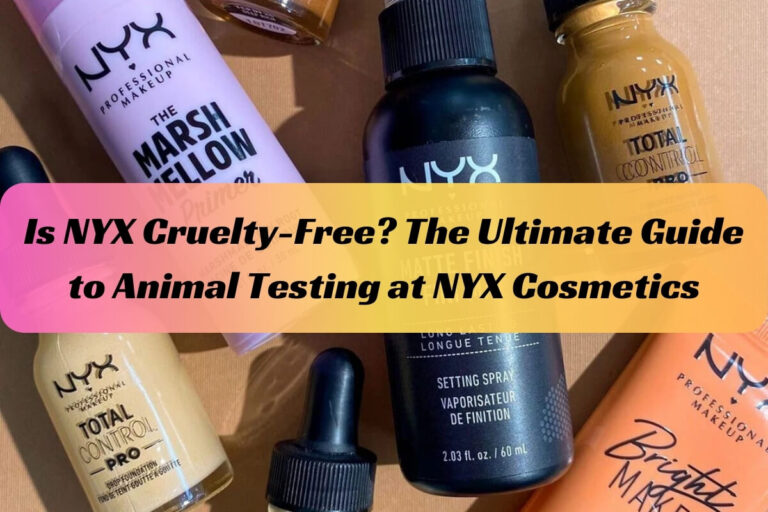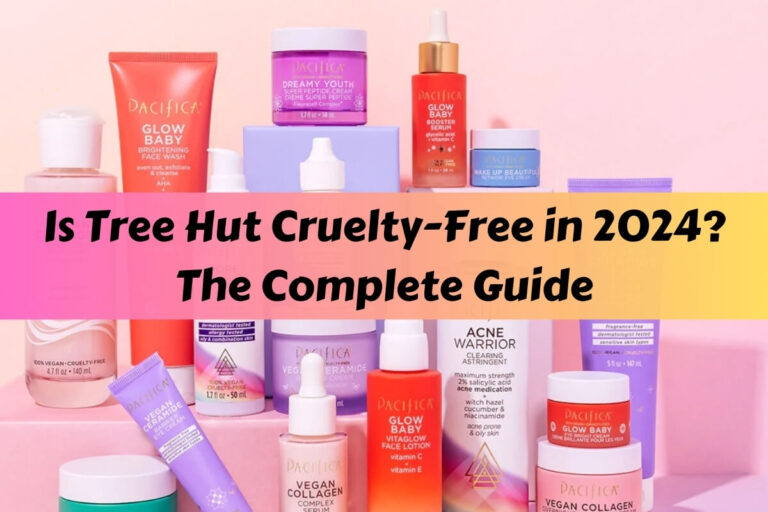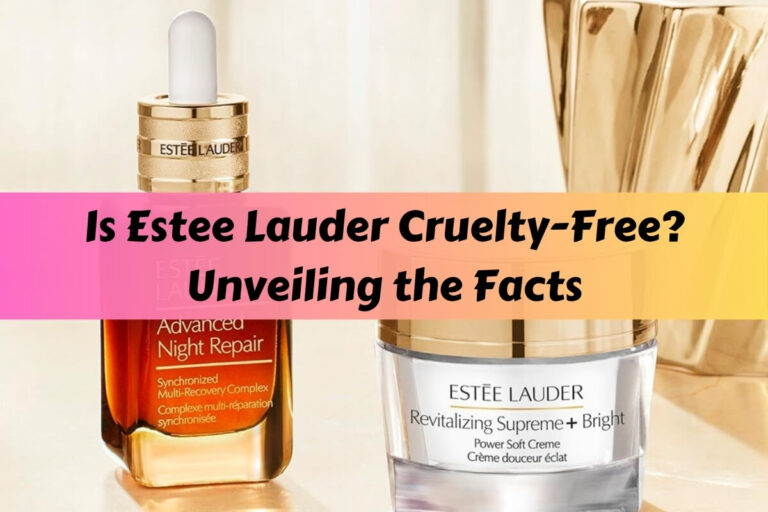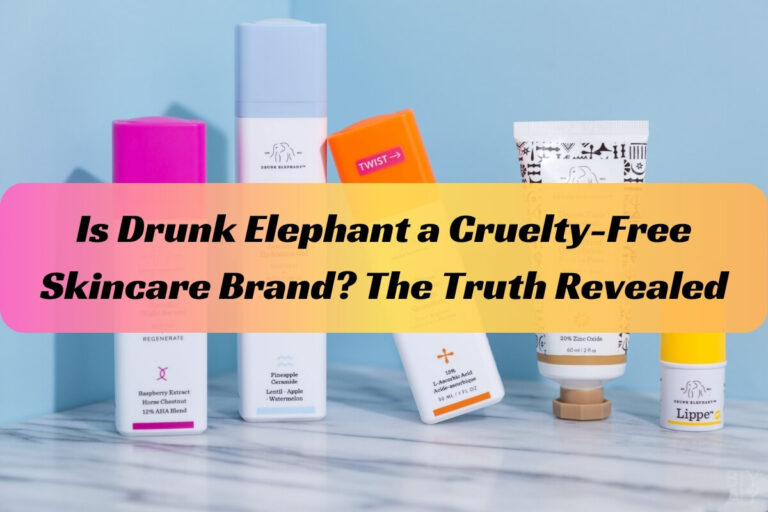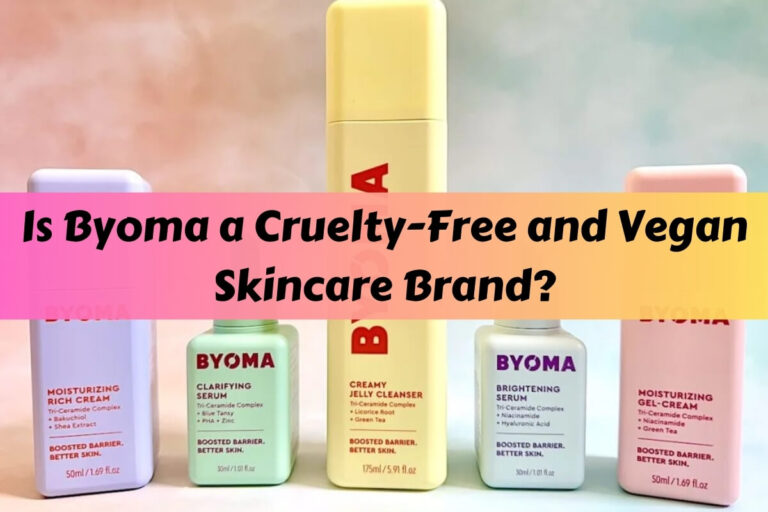Is Dove Cruelty-Free? Truth Behind Dove’s Animal Testing Policies
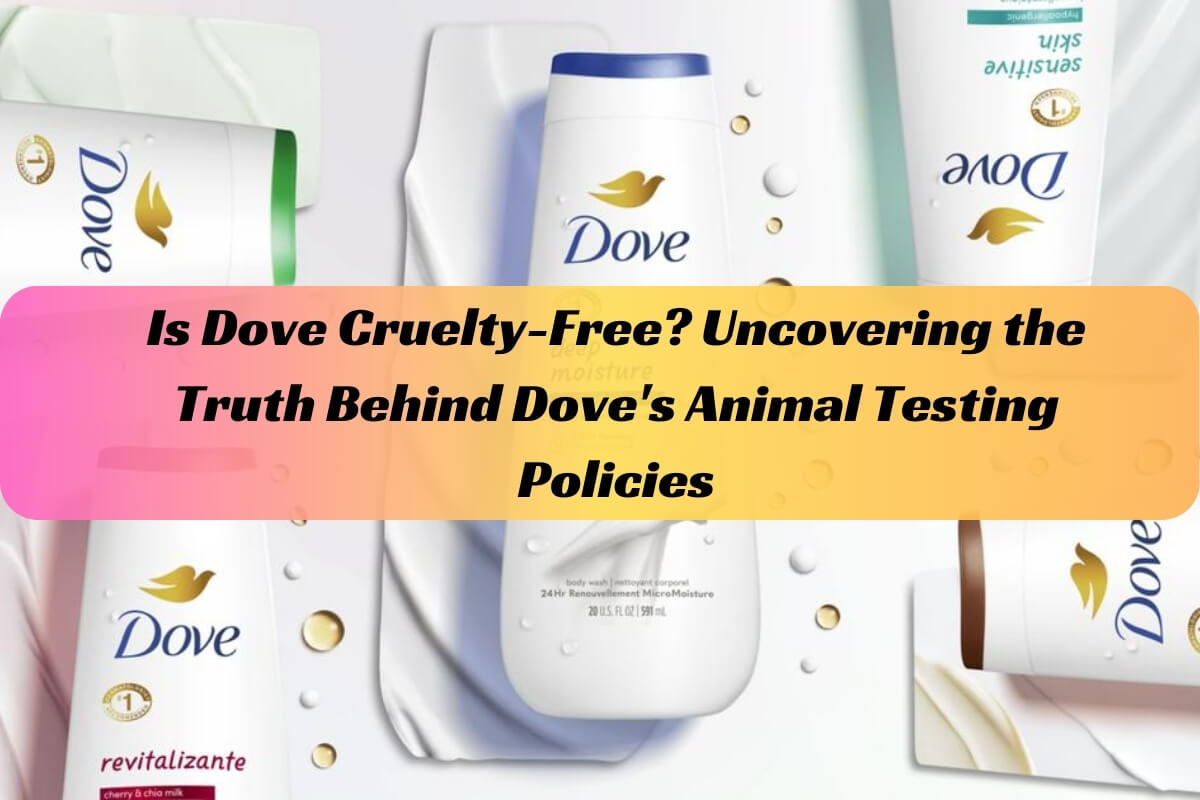
Do Dove products get tested on animals? This is an important question for caring shoppers. Dove is a big brand for soaps and creams. We’ll look at whether Dove is cruelty-free, their policies on animal testing, and how environmentally friendly they are.
Simply put, yes, Dove is considered a cruelty-free brand. However, the full story is more complex, and we’ll cover every aspect, including Dove’s certifications, parent company connections, vegan offerings, and ethical sourcing practices.
Here’s what we’ll explore in this post:
- What it truly means for a brand to be “cruelty-free”
- Dove’s certifications and claims regarding animal testing
- The complicated issue of selling cosmetics in China
- Unilever’s stance on animal testing as Dove’s parent company
- Whether Dove’s products are vegan and free from animal-derived ingredients
- Dove’s sustainability initiatives and ethical practices
So, let’s start by understanding the cruelty-free label and its significance in the beauty industry.
What Does Cruelty-Free Mean?
The term “cruelty-free” refers to products, ingredients, or formulations that are not tested on animals at any stage of development or production. This includes finished products, individual ingredients, and product samples.
For a brand to be truly cruelty-free, it must ensure that none of its suppliers or third-party entities conduct animal testing on its behalf. Additionally, the brand should not sell its products in regions where animal testing is required by law, such as certain provinces in China.
Definition of Cruelty-Free in Cosmetics
In the cosmetics industry, cruelty-free is a certification that ensures no animal testing is used in the development of a product or any of its ingredients. This testing includes but is not limited to, eye and skin irritation tests, toxicity testing, and other experiments that harm animals.
Importance of Cruelty-Free Beauty Products
The demand for cruelty-free beauty products has been steadily increasing as consumers become more aware of the unethical treatment of animals in product testing. Many view animal testing as cruel and unnecessary, given the availability of alternative testing methods that do not involve animals.
By choosing cruelty-free products, consumers can make a statement against animal cruelty and support brands that prioritize ethical practices.
Cruelty-Free Certifications (Leaping Bunny, PETA)
To provide consumers with transparency and assurance, several organizations offer cruelty-free certifications to brands that meet their strict standards. Two of the most well-known certifications are:
- Leaping Bunny Program: Administered by the Coalition for Consumer Information on Cosmetics (CCIC), this certification requires brands to undergo rigorous audits and provide proof of their cruelty-free policies.
- PETA’s Beauty Without Bunnies Program: Certified by the famous animal rights organization PETA, this program recognizes brands that have pledged to never test on animals and have met PETA’s stringent criteria.
These certifications serve as a reliable guide for consumers seeking cruelty-free products and help brands demonstrate their commitment to ethical practices.
Is Dove Certified as a Cruelty-Free Brand?
Now that we understand the significance of cruelty-free certifications let’s examine Dove’s stance on animal testing and the certifications it holds.
Dove’s Cruelty-Free Certifications and Claims
Dove is certified cruelty-free by PETA and displays the “Beauty Without Bunnies” logo. However, it’s not certified by the Leaping Bunny Program, which has stricter requirements.
On its website, Dove states that it does not test its products or ingredients on animals and has not done so since the mid-1980s. The brand claims to use non-animal testing methods to ensure the safety of its products.
Understanding Dove’s Animal Testing Policy
According to Dove’s official statements, the brand adheres to the following animal testing policies:
- Dove does not test its products or ingredients on animals.
- Dove does not commission or allow others to test on animals on its behalf.
- Dove’s suppliers and third-party entities do not conduct animal testing related to Dove products.
- Dove does not sell its products in regions where animal testing is required by law, except for certain domestically manufactured products in China (more on this later).
Evaluating Dove’s Transparency on Animal Testing
While Dove’s claims and PETA certification suggest a cruelty-free stance, it’s essential to evaluate the brand’s transparency on its animal testing policies. Dove provides detailed information on its website, addressing concerns about selling in China and clarifying its stance on post-market animal testing.
The brand states that it has requested Chinese authorities to notify them in the rare event of a consumer safety concern that may require animal testing. In such cases, Dove claims it will withdraw the product rather than allow animal testing.
Dove is transparent about its cruelty-free policies and practices, commendable for a brand of its size and global reach.
The Complicated Issue of Selling in China
One of the most significant challenges for international brands seeking cruelty-free status is navigating the complex regulations surrounding animal testing in China.
China’s Animal Testing Laws and Regulations
Historically, China has required animal testing for most cosmetic products sold within its borders, including pre-market testing on finished products and ingredients. This policy has been a major obstacle for cruelty-free brands seeking to enter the Chinese market.
However, in recent years, China has made some progress in relaxing its animal testing requirements. In 2014, the country announced that certain “general” cosmetics manufactured within China would no longer require animal testing. This exemption applies to products like makeup, skincare, and haircare, but excludes special cosmetics like sunscreens, hair dyes, and products claiming new efficacy.
How Dove Avoids Animal Tests While Selling in China
To navigate China’s animal testing laws, Dove has adopted a strategic approach. The brand confirmed that it stopped importing products into China that were not manufactured domestically, as those would have required animal testing.
Instead, Dove manufactures its “general” cosmetics within China, allowing them to be sold without pre-market animal testing. Additionally, Dove has stated that it will not launch any “special” cosmetics in China that would require animal testing.
For the rare possibility of post-market animal testing due to consumer safety concerns, Dove has requested Chinese authorities to notify the brand so that they can withdraw the product rather than allow it to be tested on animals.
Alternative Brands Certified Cruelty-Free in China
While Dove has found a way to sell in China without compromising its cruelty-free status, other brands have chosen to avoid the Chinese market altogether to maintain their certifications. Some cruelty-free alternatives that do not sell in China include:
- LUSH Cosmetics
- Too Faced Cosmetics
- Urban Decay
- Kat Von D Beauty
These brands prioritize their cruelty-free principles over potential market expansion in China, providing consumers with ethical choices aligned with their values.
Is the Parent Company Unilever Cruelty-Free?
While Dove itself is considered cruelty-free, it’s important to note that the brand is owned by Unilever, a multinational consumer goods company that is not entirely cruelty-free.
Unilever’s Stance on Animal Testing
Unilever, Dove’s parent company, has stated that it conducts animal testing only when required by law. This means that some of Unilever’s other brands or products may involve animal testing, depending on the specific regulations in different regions.
Other Unilever Brands and Their Policies
Unilever owns a vast portfolio of personal care, food, and household brands, many of which have varying policies on animal testing. Some well-known Unilever brands include:
- Axe: Considered cruelty-free by PETA
- Tresemmé: Not certified cruelty-free
- Lipton: Not certified cruelty-free
- Ben & Jerry’s: Certified vegan and cruelty-free
As consumers, it’s essential to research each brand’s policies rather than making assumptions based on the parent company’s stance.
Cruelty-Free Alternatives to Unilever Brands
For those seeking to avoid Unilever brands entirely, there are numerous cruelty-free alternatives available in the market. Some popular options include:
- Tom’s of Maine (personal care)
- Schmidt’s Naturals (deodorants)
- Burt’s Bees (personal care)
- Mrs. Meyer’s Clean Day (household cleaning products)
- Pacifica Beauty (makeup and skincare)
- Nudestix (makeup)
These brands are certified cruelty-free by organizations like Leaping Bunny and PETA, ensuring that their products and ingredients are not tested on animals at any stage.
Are Dove Products Vegan?
Being cruelty-free is a significant step, but many consumers also seek vegan products without animal-derived ingredients.
Vegan vs Cruelty-Free: What’s the Difference?
It’s essential to understand the distinction between cruelty-free and vegan products. Cruelty-free refers to the absence of animal testing, while vegan means that the product does not contain any animal-derived ingredients or by-products.
A product can be cruelty-free but not vegan if it contains ingredients like honey, beeswax, lanolin, or carmine. Conversely, a product can be vegan but not cruelty-free if it involves animal testing during development or production.
Animal-Derived Ingredients in Dove Products
Dove is not considered a fully vegan brand, as some of its products contain animal-derived ingredients. However, the brand does offer several vegan options that are clearly labeled on its website and packaging.
Some common animal-derived ingredients found in Dove products include:
- Glycerin: Can be derived from animal or plant sources
- Hydrolyzed silk: A conditioning ingredient obtained from silkworms
- Beeswax: A natural wax produced by honeybees
Vegan Products range from Dove
While not all Dove products are vegan, the brand has made efforts to cater to consumers seeking animal-free alternatives. Some of Dove’s vegan product ranges include:
- Dove Sensitive Skin Beauty Bar
- Dove Derma Series Body Lotions
- Dove Go Fresh Deodorants
Consumers can easily identify vegan Dove products by looking for the “Vegan” label on the packaging or the product descriptions online.
Sustainability and Ethical Practices at Dove
Beyond cruelty-free and vegan considerations, many conscious consumers also prioritize brands that demonstrate a commitment to sustainability and ethical practices throughout their supply chain.
Dove’s Initiatives for Sustainable Packaging
Dove has taken steps to reduce its environmental impact by implementing sustainable packaging initiatives. Some of these efforts include:
- Using 100% recycled plastic bottles for its products in North America and Europe
- Introducing plastic-free packaging for its beauty bars
- Trialing refillable deodorant formats to reduce plastic waste
Ethical Sourcing of Ingredients
Dove’s parent company, Unilever, has a policy for responsible and sustainable sourcing practices, but Dove doesn’t share detailed information on where it gets its ingredients.
Unilever is a member of the Roundtable on Sustainable Palm Oil (RSPO), which aims to promote the growth and use of sustainable palm oil. The company has also committed to protecting and restoring 20,000 hectares of forest in North Sumatra, Indonesia, as part of its sustainability efforts.
How Dove Compares to Other Sustainable Brands
When it comes to sustainability, Dove’s initiatives are commendable, but other brands have set higher standards in this area. Some examples of sustainable and ethical brands include:
- Dr. Bronner’s: Certified organic, fair trade, and cruelty-free
- Meow Meow Tweet: Vegan, zero-waste, and ethically sourced
- Ethique: Eco-friendly, sustainable, and plastic-free
These brands prioritize not only cruelty-free and vegan practices but also focus on environmentally conscious production methods, ethical sourcing, and minimizing their carbon footprint.
Conclusion
Dove is a cruelty-free brand due to its PETA certification and animal testing policies. However, its parent company Unilever is not entirely cruelty-free.
Dove offers some vegan products, but not all products are vegan. Some products contain animal-derived ingredients. Vegan consumers can check Dove’s vegan ranges or explore other vegan and cruelty-free brands.
Dove has also made strides towards sustainability by implementing eco-friendly packaging and sourcing initiatives, although other brands have set higher standards in this area.
The decision to support Dove or choose alternative brands is up to each consumer. Research and align your purchases with your values and beliefs. By making informed choices, we can create a more compassionate and sustainable beauty industry.
Remember, every purchase is a vote for the kind of world we want to live in. By supporting cruelty-free, vegan, and sustainable brands, we can create a ripple effect that encourages ethical practices and drives positive change.
